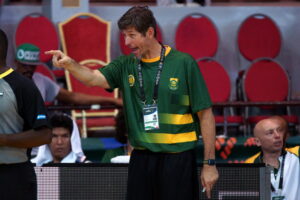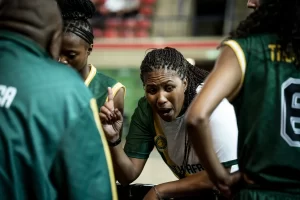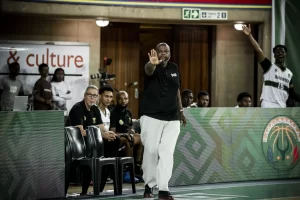SA coaches cry foul over non-payment for U18 AfroBasket
FOUR months have passed since the U18 AfroBasket (for men and women) ended on South African shores. However, some of the rubble from the chaotic way Basketball South Africa (BSA) organised the tournament remains.
The national federation appointed technical staff for the U18 teams at the eleventh hour and agreed on payments for the two-week tournament in the South African capital, Tshwane. Sadly, long-time servants of South African basketball Florsheim Ngwenya, Nosipho Njokweni and Craig Gilchrist say they and their colleagues have yet to receive their payments.
Njokweni (coach of the women’s team) and Gilchrist (assistant to the men’s team) expressed their frustration with the national federation. The former national team players intimated that this was an age-old issue, which had become worse under the current executive, stewarded by Sanele Mthiyane.
BSA took their calls, but they have now gone quiet
Gilchrist says the lack of professionalism has long been the modus operandi of BSA. “First of all, there was no direct communication with me about coaching the under-18s. I found out about it (my appointment) on a social media post on Facebook, which I do not use. My wife showed me the post saying Florsh (Ngwenya) and I had been named coaches,” said the former national team captain. “I then tried to get hold of Sanele to find out if it was fake news. He said it was not and that the secretary general (Sibongile Fondini) would get a hold of me, but he did not. Curtis (Van Wyk), the team manager, called me to make the travel arrangements, and I just got on the plane and arrived there (in Tshwane).

Gilchrist says they met with the federation’s leadership before the AfroBasket tipped off to thrash out payment matters. “Towards the end of the camp, Sanele and Sibongile (Fondini) met with the technical staff, and they said we would be paid for our time,” said Gilchrist.
Asked if they were presented with documents to sign, Gilchrist said the following: “There is never anything signed with BSA. In all my dealings with them since 1997 as a player, I have never signed anything with BSA.”
The former senior national men’s team coach says others who also served at the tournament are in a similar boat. He also says Fondini has stopped taking their calls regarding payment.
“None of the coaches, managers and medical staff have been paid from AfroBasket. Initially, the SG (Fondini) responded to our questions but has since gone quiet. We are all in the same WhatsApp group. A week ago, I got hold of Sanele and asked him (about payment). He gave me the same old political response, ‘Your message has been received and I will revert to you as soon as possible’,” said Gilchrist. “So it’s clear they are not going to pay us.”
Despite challenges with previous BSA administrations, Gilchrist says the current one has proven extremely difficult to work with. “In the nineties, we were frustrated with BSA because we felt they were not doing a proper job. If I compare that to now, they were doing a phenomenal job, there were IPTs for under-18s and 16s, national club championships that lasted longer than a week and national teams travelled regularly. They were doing way better than the current executive,” said Gilchrist.
Njokweni says things are much worse
Njokweni spoke in the same vein as Gilchrist regarding the state of the federation. “The things that happened when I was a player are still happening now since I have become a coach and it has become worse,” said Njokweni. “For the last four months, we have been asking about our payments, and their (BSA) response to us was they are waiting for money from the government. So we are still waiting and we don’t know how long that will take.”

Njokweni recalled the rushed appointments and how BSA promised contracts that never materialised. Also after fulfilling their mandate, they are still to get a cent from the federation. “Two things happened. When they (BSA) asked us to take up the (coaching) job, it was the night before (the start of the AfroBasket). The second thing, during the camp, we were told (by BSA) that we would get contracts with a specified amount of money… It was Sibongile who showed us on his laptop what the contract would look like, but to this day nothing has happened (about payment),” said Njokweni.
She lamented the state of the game by comparing the time she was a player and the present condition. Njokweni says previous administrations did try to do right by them despite the inadequacies of the time.
“I feel the federation has taken advantage of a lot of things. I’ll tell you why. Twenty years ago, I was a player too. When I was with the national team, and we were playing away, I would get $100. If we were in the country, I would get R50,” said Njokweni. “The coaches would get their contracts, sign them and even if they did not get their money immediately they would get it soon after the tournament. So at least something was happening at that time. As much as we were not happy a lot was happening. Right now nothing is happening.”
Ngwenya feels there is a loss of trust
Like his two colleagues, Florsheim Ngwenya, coach of the U18 national men’s team at AfroBasket, has experienced various BSA administrations. He believes one thing has remained the same – unchanging operational habits.
“There is a payment structure that BSA agrees on with coaches and technical staff, but (BSA does not honour that),” said Ngwenya. “It’s sad that when you enter into an agreement and the one party breaches it. It is frustrating that we are still here today.”

Ngwenya stressed the need to work in a trustworthy environment in the future, as the current way of working was not palatable. “If you come back to me and tell me ‘we need your services’. I will ask what is going to be different this time around. It’s not about financial rewards. It is about trust. If the organisation is not able to meet its obligation they have to explain why,” said Ngwenya.
The senior national team coach says what makes him sad is the federation’s failure to acknowledge the sacrifices made by the coaches and technical staff. “It was disappointing because we were handling the administration for the kids. When you receive such a huge task, you do not want to moonwalk through it. You expect that they will appreciate you. It has not been the case. Even a thank you… Or a letter of acknowledgement for the work we put in. It’s not great, but it would have been ok. All we have gotten is dead silence and that is disappointing,” concluded Ngwenya.
At the time of publishing, the BSA had not responded to our requests for comment.
SA coaches cry foul over non-payment for U18 AfroBasket Read More »










